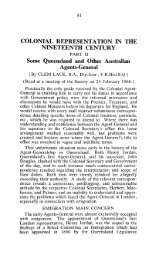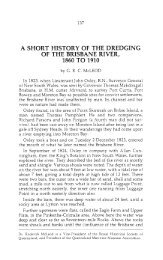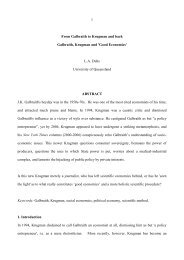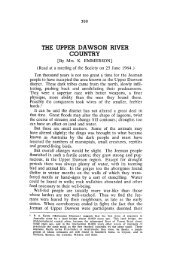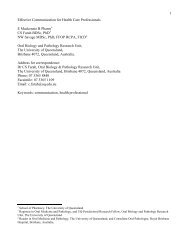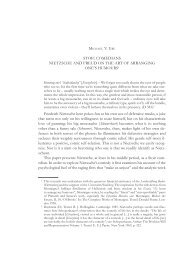907 FRAGMENTS OF LEGAL HISTORY IN ... - UQ eSpace
907 FRAGMENTS OF LEGAL HISTORY IN ... - UQ eSpace
907 FRAGMENTS OF LEGAL HISTORY IN ... - UQ eSpace
You also want an ePaper? Increase the reach of your titles
YUMPU automatically turns print PDFs into web optimized ePapers that Google loves.
<strong>907</strong><br />
<strong>FRAGMENTS</strong> <strong>OF</strong> <strong>LEGAL</strong> <strong>HISTORY</strong> <strong>IN</strong><br />
QUEENSLAND FROM 1853 ONWARDS<br />
[By MR. J. D. O'HAGAN, Under Secretary<br />
for Justice 1937-1949.]<br />
(Read at a meeting of the Society on<br />
June 24, 1954.)<br />
One hundred and four years ago the first Circuit<br />
Court was held in Brisbane, when Mr. Justice Therry,<br />
of New South Wales, presided at it. His notable<br />
address is recorded in the "Moreton Bay Courier," and<br />
portion of his charge to the jury is to be found in<br />
William Coote's "History of Queensland." Whilst Moreton<br />
Bay was a Penal Settlement, the Superintendent<br />
exercised, pursuant to an Imperial Act of 1824 and a<br />
later Statute of New South Wales, limited jurisdiction<br />
in the punishment of minor offenders. The more serious<br />
offences were dealt with at Sydney, and this continued<br />
up till May 1850 in the Free Settlement of<br />
Moreton Bay, when Mr. Justice Therry held this first<br />
Court in the Chapel of the Barracks. We all are<br />
acquainted with the period during which Captain Wickham,<br />
who resided at Newstead House, was Police<br />
Magistrate at Brisbane from November 1842, after the<br />
last of the Military Commandants, Lieutenant Gorman,<br />
had resigned. Only two men were tried and convicted<br />
at the first Circuit Court. They were indicted on the<br />
capital charge of murder at Wide Bay, and were<br />
executed on July 8, 1850, the necessary apparatus having<br />
been borrowed from Sydney. There had been four<br />
executions during the Convict Period.<br />
Between 1850 and 1856 Brisbane had Circuit Court<br />
Sittings once in each six months, for the trial of civil<br />
and criminal causes. Mr. Justice Milford came as<br />
Resident Judge in April 1857, under New South Wales<br />
legislation, but, returning to Sydney, was succeeded in<br />
March 1859 by Mr. Justice Lutwyche as Resident Judge<br />
of the Supreme Court at Moreton Bay. Circuit Courts<br />
were established at Ipswich, Drayton and Maryborough<br />
in October 1859, just before Separation.<br />
Some of Queensland's early history can be written<br />
from records reposing in strongrooms in the Treasury<br />
Building and other Government Offices. I was employed,<br />
through the Attorney-General (Hon. W.<br />
Power), in research amongst records in the Depart-
908<br />
ment of Justice, for a period of ten months after my<br />
retirement, in July 1949, from the position of Under<br />
Secretary. When Queensland was part of New South<br />
Wales, the Crown Solicitors Office at Moreton Bay was<br />
the forerunner of the Department of Justice.<br />
When Separation came in December 1859, Queensland<br />
imported from the English Bar Chief Justice Sir<br />
James (Cockle at a salary of £2,000 per annum. Judge<br />
Lutwyche was re-commissioned as a Puisne Judge<br />
under or with him, at a salary reduced from £2,000 to<br />
£1,200 per annum. Judge Lutwyche commenced lengthy<br />
correspondence on this personal subject with Premier<br />
Herbert in September 1860, on the passage of The<br />
Supreme Court Act of that year by the Queensland<br />
Parliament. The Government declined to restore the<br />
puisne judge's salary, and from Judge Lutwyche's<br />
claim arose a libel action. The "Moreton Bay Courier"<br />
had strongly criticised the Legislative Council for its<br />
resolution, favouring an increase to £2,000 in the salary<br />
of Judge Lutwyche, but condemning him for "a political<br />
partnership calculated seriously to impair confidence<br />
in the administration of justice," and for challenging<br />
the validity of the Constitution and Acts of<br />
Parliament, "but only after the close of the first Session<br />
and when a Supreme Court Bill drawn by Mr.<br />
Justice Lutwyche himself, securing certain personal<br />
advantages, had not been adopted." The libel action<br />
was tried by Judge Lutwyche, and the Jury acquitted<br />
Mr. Pugh, Editor of the "Moreton Bay Courier."<br />
Attorney-General Ratcliffe Pring was advised in 1862<br />
by the Law Offices in England, in reference to portion<br />
of the judgment, that Parliament did not form part of<br />
the actual Government of Queensland—the Government<br />
being Her Majesty's chosen advisers—but that a<br />
libel could be published concerning Parliament.<br />
Whilst Mr. Justice Lutwyche was Resident Judge<br />
at Moreton Bay, and for some years after 1859, Mr.<br />
Robert Little (who, by the way, built the first Lennon's<br />
Hotel) was Crown Solicitor and responsible, up to<br />
Separation, to the Attorney-General of New South<br />
Wales. Mr. Little was appointed with salary of £200<br />
per annum, and the right of private practice. This increased<br />
with the passing years. He took into his business<br />
a partner, so that the firm was known as "Little<br />
and Browne." It can be understood these gentlemen
909<br />
had a monopoly of lucrative Crown business. When<br />
The Native Birds Protection Bill was before Parliament<br />
Hon. B. D. Morehead, M.L.A., repeatedly sought protection<br />
for "the lawyer bird." Members knew well the<br />
lawyer vine, but none had knowledge of the lawyer<br />
bird. Mr. Morehead facetiously explained what this<br />
bird was, by describing it as "Little and Browne with<br />
a very long bill." He had been, it appears, an unsuccessful<br />
litigant in a case in which Messrs. Little and<br />
Browne had obtained for their client a verdict against<br />
him with fairly substantial costs.<br />
The first entry in the Correspondence Register of<br />
the Moreton Bay Crown Solicitor is copy of a letter<br />
dated November 26, 1858. It is a polite note beginning:<br />
"I do myself the honour to state"; and by it a<br />
Mr. Norris is advised of his appointment as Clerk in the<br />
Crown Solicitor's Office at £100 yearly. Fifteen days<br />
went by before the Crown Solicitor had occasion to<br />
write another official letter to anybody. Crown business<br />
was slack for the months of November and December<br />
1858, for only two letters appear to have been sent<br />
away by Mr. Robert Little. The number had swollen to<br />
four by the end of the Court Vacation in February<br />
1859. There was a record outward mail of six small<br />
letters on February 16, 1859. They all related to<br />
Criminal trials at the next Circuit Court. The custom<br />
in those busy days was to abbreviate the word "subpoena"<br />
so that it read, "spa," which in our times instantly<br />
suggests a mineral water.<br />
The Crown Solicitor by letter dated 16th March<br />
1859, commended Messrs. Henry Herbert and Clement<br />
Howley for their adjudication in a minor Court matter.<br />
These Justices, no doubt, were flattered by the recognition<br />
of their legal talent. The Police Magistrate at<br />
Ipswich, where the Court House built in 1859 shows its<br />
antiquity in the attractive cedar in the Court Room,<br />
asked in April 1859 for service of a "spa" on "a shepherd<br />
who had met the prisoners near a hut"—a request<br />
indicative of this pastoral period. It is amusing to learn<br />
from the records that in Sydney in those days there<br />
was a functionary styled "The (I!ivil Crown Solicitor."<br />
I wonder if his counterpart was styled "The Criminal<br />
Crown Solicitor." The Crown Prosecutor appears to<br />
have been an official superior to the Crown Solicitor for
910<br />
he says in one letter: "The Crown Prosecutor instructs<br />
me to state," etc.<br />
The most interesting entry in the Register concerns<br />
the erection of the Colony of Queensland in 1859.<br />
A whole page is reserved for this entry, which thus records<br />
in neat, enduring manuscript the historic event:<br />
"SEPARATION PROCLAIMED SATURDAY,<br />
10th DECEMBER 1859."<br />
This Government Office apparently was not closed<br />
on Saturdays, but the general rejoicings and festivities<br />
at the grant of responsible Government to the Colony of<br />
Queensland had other impact upon the Crown's legal<br />
office, for there is no entry in the Register until a week<br />
from that date has raced by. The entry is a letter from<br />
the Crown Solicitor to the Premier's Office reading:<br />
"Separation having rendered the forms hitherto used<br />
in my Department useless, I have the honour to request<br />
that you will let me know to whom I shall send requisitions<br />
for quantities of the forms I require." He was<br />
told to obtain them from Mr. Pugh—known to many by<br />
his literary work, by his valuable Almanacs and by his<br />
public service as a Police Magistrate. Whilst Police<br />
Magistrate at Warwick Mr. Pugh lectured on Early<br />
Days in Queensland. He recalled having seen two convicts<br />
flogged on the day of his arrival in Brisbane. A<br />
convict, who was stated to have received during all his<br />
penal servitude something between 2,000 and 3,000<br />
lashes, said in reply to a question by Mr. Pugh that his<br />
back was not badly scarred. When he knew he was to<br />
go to the triangle for flogging, he stripped to the waist,<br />
lay on the ground—sandy if possible—and got his fellow<br />
convicts to press, by feet and hands, on his chest<br />
so as to harden the surface of his back. A copy of Mr.<br />
Pugh's printed address is among the Crown records in<br />
the Department of Justice. By the way, the Hon. Sir<br />
John Douglas, C.M.G., delivered on October 19, 1896, a<br />
lecture in the Brisbane School of Arts entitled "A<br />
Retrospect," being a review of the principal events of<br />
Australian history since 1846 (fifty years). When Mr.<br />
Pugh was Police Magistrate at Bundaberg in June<br />
1891, a solicitor complained of a general lack of courtesy<br />
on the part of the Bench, but the Attorney-<br />
General (Hon. T. J. Byrnes) minuted Mr. Pugh's explanation<br />
as "perfectly satisfactory." Part of that<br />
explanation reads:
911<br />
"It would be absurd in me to affirm that my<br />
Court is free from the occasional acerbities of temper,<br />
on the part both of the Bench and of advocates<br />
common enough in other and higher Courts. The<br />
constant repetition of bald and baseless argument<br />
and weary platitude—the positive and sometimes<br />
offensive self-assertiveness of a Solicitor who insists<br />
that the Bench can put only one construction on the<br />
evidence—that being his own—and indulgence in<br />
long harangues in defence of cases that have no<br />
back-bone of evidence whatever—furnish, I respectfully<br />
submit, reasonable causes for occasionally derisive<br />
utterances from the Bench. To such as these<br />
. —and to such only—can I plead guilty; and if Mr.<br />
T has erred more frequently than other practitioners<br />
in my Court in these respects—though I do<br />
not say that he has—it has been his misfortune, not<br />
my fault."<br />
Place names appearing in letters in 1859 are Drayton,<br />
Gayndah, Ipswich, Dalby, Maryborough, Gladstone,<br />
Taroom, Callandoon, Condamine, Wide Bay, Port Curtis,<br />
and Rockhampton.<br />
A letter of January 25, 1860, requests the Colonial<br />
Treasurer (Hon. R. R. Mackenzie) to caH at the Crown<br />
Law Office to enter into a bond for the faithful performance<br />
of his official duty. It would be very unusual<br />
—and diverting—for an official in these democratic<br />
days to ask a Minister of the Crown to go to a subordinate's<br />
desk in a Government or semi-Government<br />
office. Public officials, especially those controlling finance,<br />
were obliged to give these fidelity bonds.<br />
There is a peremptory order in a letter of 1860 to<br />
the Chief Constable at Drayton re "John, a Chinaman."<br />
It runs: "So soon as you receive this let a mounted man<br />
start and serve the spa." Mr. Benjamin Cribb's encroachment<br />
on the Ck)urt House grounds, Brisbane,<br />
formed the subject of correspondence in that year, and<br />
Attorney-General Pring advised on the legal position.<br />
The process of freezing or chilling beef and mutton<br />
—for which full credit must be given to Mr. Thomas<br />
Mort—was not in vogue in 1860. Therefore we read of<br />
a Crown witness: "He is, I am informed, employed at<br />
one of the boiling down establishments near Ipswich."<br />
There was a boiling down establishment at Kangaroo<br />
Point. It is published that Sir Arthur Hodgson, pioneer
912<br />
squatter, used to dispose of the carcasses of his sheep<br />
at this place, and also that he travelled the tracks or<br />
roads of Brisbane with a cart, selling legs of mutton at<br />
the extravagant sum of sixpence each. Darling Downs<br />
was sparsely settled, for in 1860 the Chief Constable at<br />
Warwick states: "The prosecutrix alludes in her evidence<br />
to a woman who lives at the next sheep station"—<br />
which he does not name.<br />
The Crown Solicitor had a lot of correspondence<br />
regarding the property in William Street known as Dr.<br />
Lang's Chapel, which the Government purchased from<br />
that fiery patriot. An entry in the Register in September<br />
1860 shows that "the bond for the execution by Mr.<br />
Petrie and his sureties for erection of refreshment<br />
rooms, etc., at Parliament House (Legislative Councfl<br />
Chambers) is ready." It was not until May 4, 1869,<br />
that Parliament met for the first time in portion of the<br />
present fine building in George Street.<br />
There are letters in the early sixties to the Queensland<br />
Steam Navigation Company arranging conveyance<br />
of the Northern Mail for a term of years. There are<br />
references to the steamers "Yarra Yarra," "Telegraph"<br />
and "Clarence." Some records relate to the lease, for<br />
the use of Governor Bowen, of Dr. Hobbs' substantial<br />
residence in Ann Street, later to be used as the Anglican<br />
Diocesan Registry and now the Deanery.<br />
The official relations of the Crown Solicitor and<br />
the Auditor-General were cordial, as witness the entry:<br />
"My dear Buckley: Will you authorise a credit<br />
of £25 to defray expenses of Crown Witnesses ?"<br />
Later Mr. Buckley was prominent in the young<br />
Colony's civic life. As Chairman of the Moreton Bay<br />
Railway Company he had much correspondence with<br />
the Crown Solicitor respecting the Government's purchase<br />
of the Company's survey plans.<br />
The records show that on May 8, 1860, the Colonial<br />
Secretary and Premier (Hon. R. G. W. Herbert) was<br />
concerned about Government Office accommodation. He<br />
instructed Mr. Little to prepare a draft lease for five<br />
years of Dr. Hugh Bell's premises (where Dr. George<br />
Fullerton also had rooms), at the corner of Queen and<br />
George Streets. The property had a Queen Street frontage<br />
of 31ft. 4in. and a side measurement of 40ft. along<br />
George Street. The residence is described as a tenement<br />
and dwelling house. The Colonial Treasurer
913<br />
agreed to pay £260 per annum in equal monthly instalments<br />
as rental. Mr. D. F. Roberts was Solicitor for<br />
Dr. Bell. One can regret that the Government did not<br />
immediately acquire the freehold of this excellent<br />
building site. When Chief Justice McCawley was Crown<br />
Solicitor in 1910-1917, he discovered that a Deed of<br />
Grant had not been issued for the two acres of land<br />
upon which the imposing Treasury Building stands.<br />
The early records showed the area to be technically<br />
known as "waste land" in the occupation of the Military.<br />
Mr. McCawley had the defect remedied by the<br />
issue of the necessary deed. A similar position arose<br />
regarding the Sydney Conservatorium of Music — a<br />
former Government House on the Sydney Domain.<br />
The Registrar-General's report of the first Census,<br />
dated August 22, 1861, states:<br />
"Only one person in the whole Colony refused to<br />
supply the required information; but as it happens<br />
he is registered in the Office as a Minister of Religion<br />
qualified to celebrate marriages. Therefore, the<br />
information he refused to give was easily supplied,<br />
and I did not think it was necessary nor expedient to<br />
gratify his desire for notoriety, and to raise him to<br />
the rank of a martyr by enforcing payment of the<br />
legal penalties to which he had rendered himself<br />
liable. It certainly does excite some surprise that a<br />
Minister of Religion should have been so silly."<br />
The Report pays a tribute to Census Collectors—<br />
stressing the fact that the area covered—Brisbane to<br />
the Upper Leichhardt and the Kennedy, Taroom and<br />
Maranoa districts—had no roads and the bush was<br />
intersected by dangerous swamps and treacherous<br />
creeks with unpropitious weather and torrents of rain<br />
falling for weeks before and after April 8, 1861. The<br />
Census Collectors next week will not have these difficulties<br />
to contend against.<br />
"In 1860" (says the Editor of Our First Half<br />
Century 1859-1909) "there was not a mile of railway<br />
either open for traffic or under construction, not a<br />
mile of electric telegraph wire, nor, save between<br />
Brisbane and Ipswich, was there a formed or metalled<br />
road, the only avenues of transport being along<br />
the bridle path or the teamster's track. The country<br />
was destitute of culverts and bridges over watercourses,<br />
and the so-called roads were impassable for
914<br />
days, weeks, or even months in succession after the<br />
seasonal rains."<br />
Queensland's population in 1861 was 30,059. Brisbane<br />
had 2,754 people; Ipswich 2,888; Warwick 1,460<br />
and Gayndah 1,234. Brisbane had 364 native born<br />
Queenslanders in 1861, with 387 in Ipswich. There<br />
were 24 lawyers, 37 doctors, 32 clerics, 273 civil servants<br />
and Police, 31 in the Army and Navy, and 249 in<br />
the Mercantile Marine.<br />
Down the years the policeman's lot, in the words<br />
of Gilbert, has not been a happy one. A Drayton<br />
prisoner committed for trial at Toowoomba in 1860 had<br />
£8/2/7^ when placed in charge of a Constable escort<br />
from Brisbane. The record reads:<br />
"As the sum of £3/12/2 only is now forthcoming<br />
the Constable was called upon to account for the<br />
disposal of the sum first referred to."<br />
Attorney-General Pring had ordered a full inquiry.<br />
It disclosed that the escort allowed the prisoner to use<br />
the money en route. No doubt the way was long and<br />
thirsty. It is hoped the Constable shared some of the<br />
comforts provided by the prisoner's cash at wayside<br />
inns. The money, be it told, was part of the price he<br />
received for a stolen horse. The prisoner rejoiced in<br />
the alias of "Gentleman John." The owner of the horse<br />
was allowed what remained from its sale after deducting<br />
the cost of the prisoner's refreshments on his compulsory<br />
visit to Brisbane.<br />
Thirty years later—October 2, 1890—a Constable,<br />
escorting by steamer, from Maryborough to Brisbane,<br />
two prisoners and an insane person, had his portmanteau,<br />
containing valuable property of the prisoners, as<br />
well as warrants and property forms, quietly stolen.<br />
The portmanteau was alright at 1 a.m. but was gone at<br />
4 a.m. There was no result from an immediate search<br />
of the ship. The official report states the ship was<br />
crowded and that the prisoners and the Constable slept<br />
on the floor. The record gently adds: "There were a lot<br />
of spielers on the boat." The Sheriff at Brisbane came<br />
to the Constable's rescue with the issue of duplicate<br />
warrants.<br />
The lessee of the Toll Bar, Toowoomba, was required<br />
by the Crown Solicitor early in 1861 to have a<br />
bond and warrant of Attorney. Messrs. Birley and Cox<br />
applied at this period for a lease of a piece of ground
915<br />
near the Custom House, Petrie Bight, for wharfage<br />
purposes at a yearly rental of £10. The lessee was<br />
under obligation "to erect a stone and cypress pine<br />
wharf" and leave same in reasonable repair for the<br />
Government.<br />
The Police Magistrate, Ipswich, was requested on<br />
January 2, 1862, to have a Constable in readiness to<br />
convey the Crown Papers to Toowoomba. He was also<br />
to have a strong horse in readiness. Again in May 1862<br />
the Crown Solicitor sent this demand to the Chief Constable,<br />
Brisbane:<br />
"The Attorney-General will require an orderly<br />
and pack horse to take Crown Papers to Ipswich. Let<br />
him be at my private house in George Street, tomorrow,<br />
at half-past one o'clock. Robert Little,<br />
Crown Solicitor."<br />
The Queen's Messenger spurred forth on his Mission<br />
to spend the night at Ipswich. The Chief Constable<br />
there was informed by telegram:<br />
"Cosgrove is leaving here with Crown Papers.<br />
He will leave them with you to-night and start him<br />
early to-morrow."<br />
The road journey on a mere bush track to Toowoomba<br />
in 1862, with native fauna and flora, may have<br />
been quite pleasant, but evidently the orderly was<br />
directed to travel with dispatch.<br />
The Crown Solicitor in 1862 gave certain contractors<br />
notice of legal action if they removed any more<br />
stone from the Government Quarry at Spring Hill.<br />
They then claimed they had the Corporation's authority.<br />
Apparently, there were two adjacent quarries.<br />
One of Mr. Little's replies to an official letter is a<br />
model of brevity. This reply simply says:<br />
"It is not competent for me to give you the information<br />
sought in yours of 12th instant"—<br />
that was February 1862. In this year the Crown Solicitor<br />
asked the Attorney-General for authority to<br />
obtain, inter alia, red tape!; and as it was winter (May<br />
1862) a load of firewood, sawn in short lengths, for the<br />
office stove.<br />
The records bear the names of early settlers and<br />
pastoralists. A letter of 1862 relates to a Power of<br />
Attorney from John Alexander Bell to his brother<br />
Joshua Peter Bell, later prominent in public life, as was<br />
his brilliant son Joshua Thomas Bell.
916<br />
James Murrells (or Morrell) was a castaway with<br />
others on the Queensland coast near Bowen, following<br />
the wreck of their vessel, en route to China, in 1847.<br />
Murrells, after two or three years, in which a few of<br />
the persons from the wrecked ship and he lived with<br />
Australian natives, was the sole survivor. Murrells<br />
was with the blacks for about seventeen years, and, on<br />
his secret return to civilisation in 1863, was scarcely<br />
distinguishable from a bush aboriginal. He had retained<br />
a smattering of the English language. A station<br />
hand near Bowen, seeing Murrells' naked figure at the<br />
stockrails about dusk, raised a rifle as if to shoot him.<br />
Murrells was barely able to exclaim: "Do not shoot; I<br />
am a British object."<br />
The C.P.S. at Bowen in 1863, sent to the Attorney-<br />
General a copy, authenticated by the C.P.S.'s own signature<br />
and that of a J.P., of Murrells' first account of<br />
his experiences from the time of the wreck to his reappearance<br />
among white people. Also among the files<br />
in the Treasury strongroom is an application in the<br />
early 'sixties, signed by James ("Duramboi") Davis,<br />
for a salary of £100 per annum as Interpreter at Court<br />
trials of aboriginals. Davis, on his escape from the convict<br />
settlement at Moreton Bay, lived for a number of<br />
years with the Durundur, Murrumba and other tribes.<br />
Later he kept a shop in George Street, where this respectable<br />
citizen was murdered. He left the whole of<br />
his estate (over £500) to the Brisbane Hospital, where<br />
his name appears as one of the Life Governors of that<br />
Institution.<br />
An indictment dated January 17, 1858, shows two<br />
aborigines of this time as money-minded. The charge<br />
against Johnny, an aboriginal native of Black Snake<br />
Creek, was that he did feloniously steal, take and convey<br />
money, namely, a bank cheque for the payment of<br />
£5, or of the value of £5, the property of one William<br />
Holley. Mr. Ratcliffe Pring, the Crown Prosecutor, further<br />
informed the Court by the indictment that the<br />
said Johnny feloniously did receive one bank cheque<br />
for the payment of £5, the property of the said William<br />
Holley, he, the said Johnny, then well knowing the<br />
same to have been feloniously stolen, taken and carried<br />
away.<br />
Johnny under Police guard in the dock must have<br />
wondered what all these words meant as the indict-
917<br />
ment was read aloud in Mr. Justice Milford's Criminal<br />
Court on April 27, 1858. A noting on the copy of the<br />
indictment made in Mr. Pring's writing shows the jury<br />
found Johnny not guilty.<br />
The second native was Jacky. The indictment<br />
charged Jacky that on February 27, 1858, at Drayton<br />
he did feloniously assault one James Belcher and<br />
feloniously and violently steal, take and carry away<br />
from the person and against the will of the said James<br />
Belcher one money order, the property of the said<br />
James Belcher whom he did beat and strike immediately<br />
before the robbery. Jacky was found guilty on<br />
April 30, 1858, and for this assault and robbery Mr.<br />
Justice Milford ordered him to be kept at hard labour<br />
on the roads for three years. Let us believe that<br />
Jacky's work as a road builder helped to lessen some of<br />
the discomforts of travel in Queensland's first years of<br />
development.<br />
Admiration for our system of Justice is evoked on<br />
reading the papers relating to the revolting crime committed<br />
on January 25, 1865, by another aboriginal<br />
named Jemmy. He raped a German woman at Bundamba,<br />
and was tried at Ipswich in April 1865, before<br />
Mr. Justice Lutwyche, "a Judge of the Supreme Court<br />
assigned to hear and determine murders, felonies and<br />
other evil doings"—as the record states—and by a jury<br />
with the following names: Thomas Donaldson, Samuel<br />
Duke, W. 0. Douyere (Foreman), Patrick Dowling,<br />
Coleman Davis, George England, James Chaillie, Patrick<br />
Donigan, James Denman, George Dowden^ James<br />
Champion and John Charles Carter. The Clerk of<br />
Arraigns was William Kelson Wright. Jemmy was<br />
found guilty and sentenced to death. Jemmy's Counsel,<br />
who had been assigned by the Crown for his defence,<br />
found after the verdict and sentence that one of the<br />
jurors was an alien. There was an appeal to the<br />
Supreme Court at Brisbane. The documents indicate<br />
that Mr. Justice Lutwyche, "after diligent and mature<br />
examination of the record and proceedings decided<br />
there were errors by Jemmy and others." Mr. Ratcliffe<br />
Pring, Attorney-General and Crown Prosecutor at the<br />
trial of Jemmy, argued there was no error, but the<br />
prisoner's Counsel successfully contended that the proceedings<br />
at Ipswich were void because of the alien's<br />
presence on the jury, this being "a manifest error."
918<br />
Jemmy, in the words of the record, "prayed that he be<br />
restored to the Common Law of the Realm and to all<br />
things which he hath lost on the present occasion or<br />
that from the error a new trial may be ordered." The<br />
Appeal Court held on May 22, 1865 — less than one<br />
month after the trial and sentence at Ipswich—that<br />
there "had been manifest error to the great damage of<br />
the said Jemmy as by his complaint we are informed.<br />
We being willing (if error there be) that it should in<br />
due manner be corrected and full and speedy justice<br />
done to the said Jemmy." The Court ordered "the opening<br />
of the seals—so that it will have all things before<br />
it for a sitting on May 25, 1865." Jemmy got a new<br />
trial. Mr. C. F. Chubb was his Solicitor. The result of<br />
this trial could not be in doubt. Jemmy had to answer<br />
another indictment for a rape at Brisbane a few weeks<br />
before his crime at Ipswich, and he had also been committed<br />
for trial early in 1865 on a charge of assault.<br />
The file contains a parchment writ of habeas corpus<br />
(Jemmy, of course, being in custody) signed by Mr.<br />
Reginald Ball, Registrar of the Supreme Court. It is<br />
good to find that Justice was not denied even to this<br />
bad criminal type of black fellow.<br />
When Queensland was erected as a separate<br />
Colony on the arrival of Governor Sir George Ferguson<br />
Bowen in December 1859, it was necessary to change<br />
the Commission issued at Sydney to Mr. Justice Alfred<br />
James Peter Lutwyche, the Resident Judge in the<br />
Moreton Bay District of the Colony of New South<br />
Wales. The draft of the Commission issued to him as a<br />
Puisne Judge of the Supreme Court of Queensland is<br />
in the handwriting of Mr. Robert Little, Crown Solicitor.<br />
This document shows the ravages of time, despite<br />
the good quality paper: it is dust-stained and the<br />
edges are slightly frayed. The Commission was issued<br />
under "The Supreme Court Act of 1860." The Commission<br />
appointing Sir James Cockle—then Mr. Cockle, an<br />
English barrister and fellow graduate with Premier<br />
Herbert — to be a Judge and Chief Justice of the<br />
Supreme Court of Queensland was also issued under<br />
that Statute. He had been called to the English Bar<br />
(Middle Temple) in 1846 and later was Special Pleader<br />
of the Midland Circuit. He was Chief Justice of<br />
Queensland for seventeen years, retiring on a pension<br />
in 1879 when he had returned to England on leave.
919<br />
After fifteen years' service he was entitled under "The<br />
Supreme Court Act of 1860" to a pension representing<br />
seven-tenths of his annual salary as Chief Justice. Sir<br />
James Cockle died in England in the early 'nineties.<br />
His long residence in England on a pension drawn from<br />
Queensland was regarded unfavourably by some people<br />
here. His name is permanently linked with Queensland<br />
by The Sir James Cockle Memorial Prize awarded annually<br />
at the Brisbane Grammar School for the best<br />
school pass in mathematics. Mr. Frederick William<br />
Dickson, many years Crown Prosecutor of District<br />
Courts and several times an Acting Judge of both the<br />
District Court and the Supreme Court, won the Cockle<br />
Memorial Prize twice in succession. He was a son of<br />
Sir James R. Dickson, a former Queensland Premier<br />
(1898-1899) and Minister for Defence in the first Federal<br />
Cabinet in January 1901.<br />
It is of interest to note that Attorney-General<br />
Pring inserted in Mr. Little's draft of Justice Lutwyche's<br />
Commission the words "our Royal" so that the<br />
usual phrase read: "Having taken into our Royal Consideration<br />
your loyalty, learning, integrity and ability,"<br />
etc. The use of "Our Royal" must have been very pleasing<br />
to Governor Bowen, who signed the Commission as<br />
Her Majesty's Representative. These words have not<br />
been in use in similar Commissions issued in the Sovereign's<br />
name for very many years.<br />
The Crown Solicitor wrote on February 24, 1864,<br />
to Mr. A. Fitzgibbon, Engineer in Chief of Railways,<br />
Ipswich, regarding the contract for the building of the<br />
first section (twenty miles) from Ipswich to the Little<br />
Liverpool Range of the Southern and Western Railway.<br />
This was the start of our lengthy railway system, and<br />
recalls for us the classical name of Grandchester given<br />
by Sir George Bowen to replace the name of Bigge's<br />
Camp.<br />
The Register shows that a bond for the contract<br />
for building the Brisbane General Hospital at Bowen<br />
Bridge Road was entered into in April 1866. Brisbane's<br />
first Public Hospital was at North Quay, where the<br />
Supreme Court House built by Mr. John Petrie in 1879<br />
now stands.<br />
The Minister for Lands and Works requested the<br />
Crown Solicitor in March 1864 to prepare a fifteen<br />
years' lease from the Crown to Messrs. G. D. Webb,
920<br />
George Edmonstone, L. A. Bernays, John Campbell,<br />
Henry Buckley and Robert Cribb, directors of and in<br />
trust for a Company called "The Brisbane Gas Company,"<br />
which would supply fuel and lighting gas to the<br />
residents of Brisbane. The rental was to be the nominal<br />
figure of £5 per annum, and there was to be a right of<br />
purchase of the land. A further provision in the draft '<br />
was that the rental should be equal to 10 per cent, of<br />
all gold obtained from the land. This provision, however,<br />
was deleted from the draft agreement. The<br />
Crown reserved the right to remove all timber, stone,<br />
gravel, earth or other materials required for any lawful<br />
public purpose. The draft, in accordance with instructions,<br />
has a blank space for description of the land.<br />
Apparently, the land was adjacent to the Brisbane<br />
River at Petrie Bight, just below All Hallows' Convent<br />
Hill, and not far from the street in Fortitude Valley<br />
named after Sir George Gipps, Governor of New South<br />
Wales.<br />
Records in the Department of Justice relative to a<br />
libel action contain copy of a letter from a Mr. J. V.<br />
Sidney, of Dalby, to the "Moreton Bay Courier," under<br />
date December 15, 1860, reading:<br />
"It reminds me of a story of the late Sir George<br />
Gipps who upon seeing a map of the first land sale<br />
at Brisbane (this would be in or about 1842) cut<br />
every acre into two with his pencil—saying the public<br />
would give as much for half an acre as they would<br />
for a whole one. (Until this time all Town lots were<br />
one acre.)"<br />
An entry in the Register, under date December<br />
1864, reminds us of the Bushrangers. It records an<br />
inquiry from the Police Magistrate at Rockhampton,<br />
on behalf of the New South Wales Government, "for<br />
property of Francis Christie, alias Gardiner, alias<br />
Clarke," whose betrayal and capture, whilst holding a<br />
publican's licence in the Central District, were described<br />
in the "Sunday Mail" about thirteen years ago.<br />
It is the duty of the Attorney-General annually to<br />
forward to His Excellency the Governor, for the information<br />
of the Dominions Office—formerly the Colonial<br />
Office—a report upon each Act passed by Parliament in<br />
the preceding Session. Sir Charles Lilley, Attorney-<br />
General in 1866, wrote this:
921<br />
"The great increase in the crimes of bushranging<br />
and robberies under arms in the neighbouring<br />
Colony of New South Wales led to the passing by the<br />
Legislature of that Colony of an Act similar in its<br />
provisions to the Queensland Act, 30 Victoria, No. 2,<br />
now reported upon. It had been quite impossible to<br />
repress these crimes by the Criminal Statutes up to<br />
that time in force, and the great success which followed<br />
the passing of the Act in New South Wales—<br />
especially that part of it which deals with those harbouring<br />
and abetting the bushrangers—led to the<br />
introduction of a similar law in this Colony of<br />
of Queensland, where outrages of the kind had become<br />
but too frequent. It is merely for one year, and<br />
has already had a beneficial effect in this Colony."<br />
Early files show letters addressed to Brisbane Town;<br />
just as, a few years later, Normanton was named as<br />
Norman Town and Burketown was spelt as two words.<br />
A printed document of the early 'sixties bears the<br />
address: "To His Excellency Sir George Ferguson<br />
Bowen, Knight Grand Cross of Saint Michael and Saint<br />
George, Captain General and Governor in Chief of the<br />
Colony of Queensland and its Dependencies, and Vice-<br />
Admiral of the same."<br />
It is not difficult to imagine the strength of the<br />
Colony's land and sea forces at that date!<br />
Another formal document was presented on June<br />
27, 1865, to "His Excellency The Honourable Maurice<br />
Charles O'Connell, by Her Majesty's Royal License, a<br />
Knight Commander of Isabella The Catholic, Knight of<br />
the Second Class of San Fernando, and a Knight Extraordinary<br />
of Charles Third of Spain, President of the<br />
Legislative Council of the Colony of Queensland, and<br />
Administrator of the Government thereof."<br />
Sir Maurice O'Connell had been a soldier in Spain.<br />
A link with the American Civil War is in the<br />
Crown Solicitor's Register of Correspondence in the<br />
year 1867. The American Civil War had given impetus<br />
to cotton growing at Ipswich and other centres. A<br />
patentee obtained from the Crown Solicitor in 1867<br />
letters of registration of a'means of improving the<br />
baling of cotton.<br />
There is much of interest and of pathos in the<br />
records relating to the Administration of Justice.<br />
These documents—readily available—cover the period
922<br />
from 1857—that is for nearly 100 years. There are<br />
almost countless folios of depositions taken at Inquests<br />
or Magisterial Inquiries into the causes and circumstances<br />
surrounding a very great number of deaths in<br />
Queensland, accidental, sudden or suspicious. Many a<br />
human tragedy and many an act of courage are here<br />
recorded; and the varied causes of death indicate the<br />
changes along the way from the hard pioneering stage<br />
of Queensland to its present stage of development.<br />
There are in the earliest times the accounts of<br />
murders by natives, the deaths from snake venom,<br />
from accident and from disease, the deaths from heat<br />
stroke—all incidental to pioneer life. Loss of human<br />
life from crocodiles in the Central and Northern portions<br />
of Queensland was fairly frequent. The Inquest<br />
depositions record the tragedies of the bush: fatal<br />
accidents with stock, deaths from exposure, thirst and<br />
starvation when men were lost in trackless areas of<br />
field and forest and scrub; drownings in flood and other<br />
waters; deaths through lack of medical care in dangerous<br />
illnesses, and deaths from other perils inseparable<br />
from pioneering in a young land of magnificent distances<br />
and, for the major part, not inhabited except by<br />
nomad tribes of natives.<br />
Then, too, there are the records of crimes, great<br />
and small — some of much notoriety. The earliest<br />
Criminal Register in the Treasury Building strongroom<br />
bears date 1861-1865 and is one of a large number of<br />
volumes containing hundreds, nay, thousands of names,<br />
and references to a wide diversity of crime. The advent<br />
of Polynesian labour brought an added quota of grave<br />
offences against morality and life. Tied up in neat<br />
bundles in the Department of Justice strongroom are<br />
depositions sixty to ninety years old. Even a cursory<br />
glance at some of the pages in the Criminal Register<br />
shows the distressing number of capital crimes by<br />
natives against white females. Murders of blacks were<br />
frequent, and Chinese—especially on the Palmer Goldfield<br />
area—were often the victims of murder by blacks.<br />
There is abundant evidence of very long and irksome<br />
journeys by doctors, police and witnesses. Frequently<br />
it was necessary to bury dead human bodies days before<br />
the surgeon could reach the isolated scene or place<br />
of a fatality, a sudden, natural death or of a murder;<br />
and post mortem examinations after exhumation in
923<br />
such cases, under primitive and crude conditions, must<br />
have been distinctly unpleasant and—as the records<br />
reveal—often inconclusive.<br />
The difficulty of travel in 1870 is apparent from a<br />
letter dated March 28, 1870, from Mr. Henry J. Edkins,<br />
of Burke Town, from which outpost he had gone by<br />
steamer to Norman Town in January 1870. He had<br />
proposed to go on horseback from Norman Town to<br />
Rockhampton, where he was a Crown witness in a murder<br />
case Queen versus Ah Sam, Ah Foo and James<br />
Shaw, all of Burke Town. Flooded country kept him at<br />
Norman (as this Gulf centre was then also named)<br />
from early in January of that year and no sea travel to<br />
Rockhampton was available. Mr. Edkins said that<br />
when the flood waters subsided it was impossible to<br />
travel so as to reach Rockhampton for the Court, the<br />
roads and watercourses being passable only by an<br />
expert swimmer.<br />
"I have travelled (he wrote to the Attorney-<br />
General) in and out the last two years in the month<br />
of February, but this year from December up to the<br />
present time (March 28) no mail has been able to<br />
travel between Bowen, Norman and Burke Town."<br />
Mr. William Finucane, Recording Clerk and C.P.S.,<br />
Norman, certified that Mr. Edkins had been unable to<br />
leave the district from the beginning of the year, as<br />
"communication by land has, consequent upon the<br />
floods, been stopped during the above period and there<br />
has been no opportunity of travelling by sea."<br />
Not long after this Mr. Scott, of Taroom, asks that<br />
his wife be excused from attendance as a Crown witness<br />
at a Charleville Circuit Court. He points out that<br />
she and her young children are ill; that she is nursing<br />
a baby a few weeks old; and that the long journeys to<br />
and from the Court must be on horseback with her<br />
infant. The pioneer's life was not easy. And here is an<br />
extract from the "Courier-Mail" of May 13, 1953:<br />
"Pioneering hardships of the Far North were recalled<br />
yesterday by some of the leading personalities<br />
attending at Innisfail the Queensland Countrywomen's<br />
Association Annual Conference. Tucked with<br />
her brothers and sisters into wooden cases slung on<br />
either side of pack horses is the first form of transport<br />
remembered by Mrs. E. M. Eldridge, President of the<br />
Cooktown Branch of the Q.C.W.A. Mrs. Eldridge, who
924<br />
will be sixty-two next week, has lived all her life in the<br />
Cooktown district. She was one of seven children, and<br />
her father, who owned tin mines, used this unusual<br />
method for taking his family from one mine to another<br />
in the early days. Often Mrs. Eldridge did not see,<br />
after her marriage to another tin miner, a white<br />
woman for two and a half years at a time.<br />
On September 20, 1865, the Attorney-General<br />
(Hon. Charles Lilley, Q.C.) wrote as under to Mr.<br />
Edmund Sheppard, Barrister at Law, Sydney:<br />
"I wish to know if you would entertain an offer of<br />
our Metropolitan District Judgeship.<br />
"A copy of the Act recently passed is forwarded<br />
herewith. The law, except as modified by this Act, is<br />
identical with that of New South Wales under 22 Vic,<br />
No. 18. The provisions of our several amending Acts<br />
have been incorporated and a Criminal and Quarter<br />
Sessions Appellate Jurisdiction added.<br />
"The salary of the Judge is to be £1,000 a year.<br />
The Sittings of the Metropolitan Court would be held at<br />
Brisbane; Ipswich—25 miles; Toowoomba—70 miles;<br />
Dalby—120 miles; Warwick—70 miles; and from Toowoomba—40<br />
miles.<br />
"The distances are reckoned from Brisbane unless<br />
otherwise mentioned. Ipswich can be reached in three<br />
or four hours by coach or steamer, and to other places<br />
railways are being rapidly constructed which will probably<br />
reach the extensive limits of the jurisdiction by<br />
the end of 1867. An answer by telegram will oblige, as<br />
time presses."<br />
On September 29, 1865, Mr. Lilley acknowledged receipt<br />
of a telegram from Mr. Sheppard accepting the<br />
offer. The Attorney-General said the Courts would "be<br />
proclaimed as soon as possible after the return of the<br />
Governor and other Ministers from the North and your<br />
Commission will be prepared so as to be ready for you<br />
immediately after your arrival in Brisbane as expected<br />
on or about December 1 next. In the meantime permit<br />
me respectfully to draw your attention to the duties<br />
specially appertaining to your Office on the estabHshment<br />
of Courts for the first time under the Act 22 Vic.<br />
No. 18 and our enactment 29 Vic. No. 10, which I sent<br />
to you with my former letter—I mean the Rules and<br />
other matters which I need not particularise."
925<br />
Mr. Lflley, in asking the Colonial Secretary (Mr.<br />
Herbert) and the Surveyor-General in 1865 for descriptions<br />
of the proposed districts, stated:<br />
"The three districts—each of them to be distinct—<br />
must embrace the whole Colony; and the boundaries<br />
must be defined so as to show in the plainest possible<br />
way the jurisdiction of each Court and the separation<br />
of the one from the other by boundaries easily traceable.<br />
Give descriptions for popular information apart<br />
from the technical ones to be embodied in the Proclamation.<br />
Any suggestions for re-arranging the Districts<br />
on the proclamation of additional Courts will be<br />
useful regard being had to the progress of our railway<br />
works and the probable rise of new towns, etc."<br />
Dalby was taken from the proposed Metropolitan<br />
District and placed in the proposed Western District<br />
with Condamine and Roma. Clermont and Gayndah<br />
were placed in the Northern Division and Springsure<br />
was omitted.<br />
Mr. Charles William Blakeney, a Brisbane barrister,<br />
was appointed Judge of the Western District; and<br />
Mr. Sheppard, of course, took up duty at Brisbane following<br />
his appointment in 1865. Mr. T. George Long<br />
Innes, a member of the Sydney bar, to which he soon<br />
returned, was made Northern District Court Judge at<br />
Bowen. Three District Court Crown Prosecutors were<br />
appointed—namely, Mr. John Gore Jones for the Metropolitan<br />
District; Mr. William Henry Abbott Hirst—<br />
afterwards Judge—for the Northern District; and Mr.<br />
John Killeen Handy, for the Western District. Mr.<br />
Henry Alexander Elliott became Registrar at Brisbane;<br />
Mr. Frank Newell Bedek, C.P.S., Rockhampton,<br />
was appointed Registrar for the Northern District and<br />
Mr. Gustavus Birch, C.P.S., Ipswich, was made Registrar<br />
there for the Metropolitan District.<br />
This is the final allotment of Courts proclaimed on<br />
November 1, 1865:<br />
For Metropolitan District, at The City of Brisbane<br />
(Brisbane was no longer a Town) ; Ipswich; Toowoomba<br />
; and Warwick.<br />
For Northern District, at Rockhampton; Gladstone;<br />
Clermont; Bowen; Maryborough; and<br />
Gayndah.<br />
For Western District, at Dalby; Condamine; and<br />
Roma.
926<br />
Judge Blakeney appears to have had Condamine<br />
as his headquarters. It then had a Police Magistrate<br />
(Mr. Lukin) whose son, Mr. Justice Lionel Oscar<br />
Lukin, was born there. The only hotel now at Condamine<br />
looks very old, the trough in its well-worn cypress<br />
pine step outside the public entrance indicating extensive<br />
patronage over the years. Judge Blakeney felt the<br />
call of the city lamp lights in 1867. Having prolonged<br />
a visit to Brisbane, he was requested by the Attorney-<br />
General on March 9, 1867, to return to his District.<br />
Preliminary arrangements for the functioning of<br />
District Courts did not go smoothly. Police Magistrates<br />
and Benches of Magistrates had the right—freely exercised—to<br />
address the Honourable the Attorney-(ieneral<br />
direct on official matters, and he replied personally to<br />
this correspondence, but he did not communicate<br />
directly with Clerks of Petty Sessions. Mr. Lilley was<br />
enthusiastic about the establishment of the District<br />
Courts, which accounts for his departure from the rule,<br />
still obtaining, when he wrote a stinging reply on<br />
November 24, 1865, to a letter Mr. Wilkie, Secretary,<br />
Crown Law Office, had received from a querulous, critical<br />
v^.x .o.:<br />
"The instructions forwarded to you on the 13th<br />
November from this Office were perfectly clear and<br />
correct.<br />
"They were not sent to induce you to enter into<br />
a correspondence with this Department and to display<br />
your inability to understand the District Courts<br />
Act, under which you have been appointed a Registrar,<br />
for a time, and the Jury Acts in force in the<br />
Colony ....<br />
"If you do not peruse the Acts and comprehend<br />
your duty with greater accuracy I shall be compelled<br />
to take steps at an earlier period than I intend to<br />
appoint a Registrar charged with the duties of that<br />
Office only in the Northern District."<br />
A few years later this official was found, owing to<br />
family misfortune and low rate of salary, to have substantial<br />
shortages in his official moneys, and his exit<br />
from the Civil Service ended all his worries about the<br />
District Courts or Jury Acts. The Attorney-General<br />
(Mr. Bramston) showed him the greatest consideration,<br />
even giving him time to collect a large sum for<br />
restnution. Sad to relate, two of the highest officials
927<br />
in the Civil Service were prosecuted for peculation of<br />
public funds not long after Queensland was set up as a<br />
separate Colony. But there was a humorous instance<br />
of cash shortages at Gladstone in 1869, when the defaulting<br />
Sub-Collector of Customs wrongfully accused<br />
the visiting Audit Inspector of having abstracted and<br />
stolen from the office safe the amount of the shortage<br />
in the Customs revenue there. The audit inspector,<br />
who was arrested on the official's complaint, but<br />
promptly discharged from custody, had made the serious<br />
error of accepting from the Sub-Collector the keys<br />
of the safe and of opening it, whilst that official was<br />
designedly absent from the office to keep an appointment<br />
with a lady. The Sub-Collector was committed<br />
for trial at the District Court, Rockhampton, and was<br />
acquitted on one of three charges of fraudulent appropriation<br />
of public moneys. It appears evidence required<br />
by the Crown Prosecutor was not forthcoming, so he<br />
withdrew the charge. Attorney-General Pring advised<br />
the Colonial Treasurer that, because of peculiar circumstances,<br />
no criminal charge could be laid or established<br />
against the Customs Officer. Each sub-collector<br />
had been authorised by the Treasury to retire all Treasury<br />
notes presented to him for that purpose out of<br />
moneys—Customs revenue—he might have in hand.<br />
The Gladstone Sub-Collector said he drew O.H.M.S.<br />
cheques in favour of persons to whom he was privately<br />
indebted instead of paying them by Treasury notes,<br />
which Treasury notes must ultimately have been retired<br />
by him by a like sum out of Consolidated<br />
Revenue. Mr. Pring referred to "conduct of a highly<br />
suspicious character—irregular and subject to severest<br />
censure, but it would not form the ground of a criminal<br />
charge. However, the day after he gave this advice,<br />
the Attorney-General read correspondence from the<br />
Sub-Collector and directed the Crown Prosecutor at<br />
Rockhampton to file indictments. The record is silent<br />
as to the result of these trials.<br />
Not long after this a District Court Judge at Rockhampton<br />
gave judgment in his own Court against himself<br />
in three claims by his creditors. The Attorney-<br />
General (Hon. S. W. Griffith) obtained a report from<br />
him and the Judge, at his express request, was permitted<br />
to address the Governor in Council in person at
928<br />
Brisbane. He failed in his pleas and was obliged to<br />
relinquish office.<br />
There were in these early times no postal notes<br />
nor money orders, but bank drafts could be obtained—<br />
at a cost. The records show one method of remitting<br />
moneys was to cut Treasury notes in half and post the<br />
halves in separate mails!<br />
The case of Thomas John Griffin, who poisoned and<br />
then fatally shot at the Mackenzie River in November<br />
1867 the two Police troopers accompanying him as the<br />
Gold Escort from the Union Bank at Rockhampton is<br />
well known. Newspaper articles have been written<br />
about it and a novel ("Lost for Gold") has the crime as<br />
its chief incident. Griffin, by reason of his education,<br />
handsome appearance and good manners had easy<br />
entree to Brisbane society and he was an invited guest<br />
at Government House. Fast living and loose habits at<br />
Claremont (now Clermont), where he was Gold Receiver<br />
and Gold Commissioner, depleted his private and<br />
official cash. Pressed by some Chinese to restore to<br />
them gold entrusted to his custody, he yielded to temptation<br />
to murder and rob his unfortunate Police companions<br />
of the Gold Escort. He was convicted of this<br />
crime, and hanged at Rockhampton in 1868. Records<br />
of his trial, as well as letters in his fine handwriting,<br />
are in the Department of Justice strongroom. Griffin<br />
had lain for less than a week in his grave when it was<br />
surreptitiously broken up and his head removed. Popular<br />
rumour said a Rockhampton surgeon had Griffin's<br />
skull for years.<br />
The Department holds records of the riotous days<br />
in September 1866 when about 500 unpaid Government<br />
workers assembled in Brisbane to enforce their just<br />
claims. William Eves, Henry Parker and John Murray<br />
felt the heavy hand of the Authorities, and received<br />
on their conviction for participation in the disturbances<br />
sentences of imprisonment ranging respectively from<br />
three months to twelve months. The indictment drafted<br />
and prosecuted by Attorney-General Lilley is long and<br />
contains quaint, if not fearsome phraseology. The<br />
Crown called ten witnesses at the trial, including Mr.<br />
D. T. Seymour, who had been A.D.C. to Governor<br />
Bowen for two years before becoming on January 1,<br />
1863, the first Commissioner of Police in Queensland;<br />
and also Mr. H. H. Massie, later Under Colonial Secre-
929<br />
tary. He succeeded Mr. Manning after the latter had<br />
been savagely attacked in his office with a tomahawk,<br />
his assailant being a half-demented C.P.S. Under<br />
special legislation Mr. Manning drew a pension of £300<br />
per annum for several years and on his demise half<br />
this sum was paid yearly to his widow.<br />
To-night, I am forced by considerations of time to<br />
omit many things and to concentrate on a limited<br />
period only in Queensland legal history. Many eminent<br />
men have been responsible in this State for the due<br />
administration of Justice, and documents of historic<br />
significance came to them for perusal and advice. I<br />
have left at the Department of Justice an extended<br />
narrative which embodies the results of a ten months'<br />
survey of records.<br />
Decades of years have elapsed since the hands—<br />
now turned to dust—made the entries in the early<br />
Registers of Correspondence and penned the letters in<br />
the official files, but those records of distant days are<br />
as legible as when they were written. The handwriting<br />
is good; the ink has not faded; and, except for some<br />
small damage by flooding, the documents are well preserved.<br />
There are treasures in Government strongrooms<br />
safe from moths and rust and placed where thieves<br />
cannot break in and steal. These documents will bring<br />
pleasure to some future historian seeking original<br />
material in the State archives. He will be fascinated<br />
by research and discovery even in the dank atmosphere<br />
of basement strongrooms. Queensland should not delay<br />
in following the recent example of Western Australia<br />
in collating and co-ordinating and preserving its valuable<br />
State records.


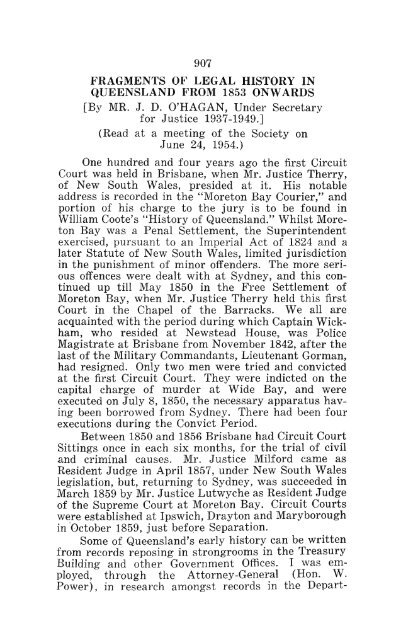
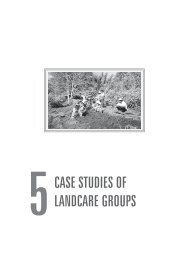
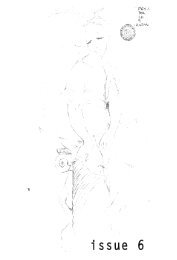
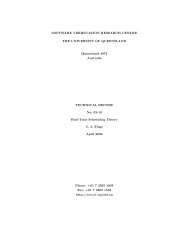
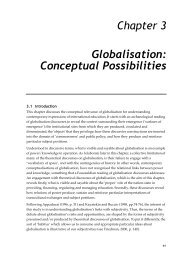
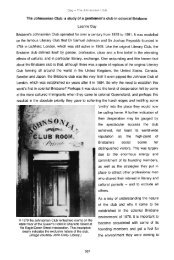

![Kanaka Labour in Queensland, [ises-mi] - UQ eSpace](https://img.yumpu.com/21925421/1/163x260/kanaka-labour-in-queensland-ises-mi-uq-espace.jpg?quality=85)
